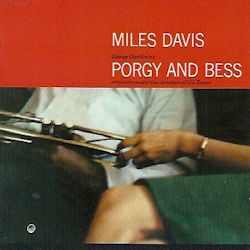Porgy and Bess
1.The Buzzard Song
2. Bess, You Is My Woman Now
3. Gone
4. Gone, Gone, Gone
5. Summertime
6. Bess, Oh, Where's My Bess
7. Prayer (Oh, Doctor Jesus)
8. Fishermen, Strawberry and Devil Crab
9. My Man's Gone Now
10. It Ain't Necessarily So
11. Here Come De Honey Man
12. I Loves You, Porgy
13. There's a Boat That's Leaving Soon for New York
Miles Davis
– Trumpet, flugelhorn
Johnny Coles, Bernie Glow, Ernie Royal, Louis Mucci – Trumpet
Joe Bennett, Frank Rehak, Jimmy Cleveland, Dick Hixson – Trombone
Willie Ruff, Julius Watkins, Gunther Schuller – French horn
Bill Barber
– Tuba
Phil Bodner, Jerome Richardson, Romeo Penque – Flute, clarinet
Julian ‘Cannonball’ Adderley – Alto sax
Danny Bank – Bass clarinet, flute
Paul Chambers
– Bass
Jimmy Cobb
– Drums (tracks 1, 2, 5-8, 10-13)
Philly Joe Jones
– Drums (tracks 3, 4,
Gil Evans –
Arranger, conductor
Bonus tracks
14. But Not For Me (take 1)
15. But Not For Me (take 2)
16. The Man I Love (take 1)
17. The Man I Love (take 2)
Miles Davis – Trumpet
Sonny Rollins – Tenor sax (tracks 14, 15)
Horace Silver – Piano (tracks 14, 15)
Milt Jackson – Vibes (tracks 16, 17)
Thelonious Monk – Piano (tracks 16, 17)
Percy Heath – Bass
Kenny Clarke - Drums
In his Autobiography, trumpeter Miles Davis notes that ‘Back in bebop, everybody used to play real fast’. In his early days, Miles tried to play
along with bebop musicians but he often couldn’t manage the fast tempos that they demanded. His ‘Birth of the Cool’ experiments with Gil Evans and others
in 1949 and 1950 convinced him to cease trying to play bebop and adopt a sparser, more economical style. This style is prevalent in three albums which Gil
Evans arranged and which are generally considered among the best recorded by Davis and Evans: Miles Ahead, Porgy and Bess and Sketches of Spain.
Even the more economical style that Miles adopted couldn’t prevent him from making errors. As Gene Lees said in his review of Porgy and Bess in Down Beat magazine: ‘Some of the best of Miles is to be heard in this album – along with some of the sloppiest. There are cracked and fuzzed notes
and other things that just shouldn’t have been let go’. Let’s face it: this album contains many examples of fluffs and wrong notes from Miles, and his
trumpet or flugelhorn is often out of tune with the orchestra. This may add to the poignancy of the album, which can certainly tug at the heartstrings. The
overall mood of the music is introverted and melancholy. Miles mainly used the flugelhorn or muted trumpet to achieve a soft, somewhat mournful tone, which
matches the tragedy in the story of Porgy.
Whatever its deficiencies, Miles’ plaintive tone is one of the things which gives this album its distinctive quality. The other factor is the arranging
skill of Gil Evans. He avoids the big-band clichés and creates a warm wash of tone colour behind Miles. He moulds the music like a concerto and creates
varied timbres to suit the different tracks. For example, take the rich textures he builds up in Summertime, a tune so hackneyed that you might
think it couldn’t sound fresh. Evans achieves freshness by adding a new ostinato behind Miles. Note the orchestra’s subtle counterpoint behind Miles in Bess, You Is My Woman Now. In Prayer (Oh Doctor Jesus), you can hear an instrumental ‘Amen’ repeated potently several times,
with the low brass adding a potent undertow. This track illustrates one of Gil’s weaknesses: his tendency to over-use riffs, however appropriate they may
be.
The recording engineers also deserve praise for giving depth to the sound. In Gone, Philly Joe Jones’ drums have an added kick provided by the
echoey acoustic. This track and There’s a Boat That’s Leaving Soon for New York are the only optimistic cuts on the album, assisted by the rich
acoustic.
This reissue omits the two extra takes which were included on the 1997 CD of the album. However, there are four bonus tracks from 1954 in which Miles
performs Gershwin tunes with the likes of Sonny Rollins and Milt Jackson. Thelonious Monk does a couple of very odd solos on The Man I Love,
reducing economy to its barest bones.
This album is far from being ‘the greatest jazz album of all time’, as one critic put it. But it presents us with a novel approach to the Gershwins’
masterpiece, encapsulating the pity in the story through some ground-breaking jazz.
Tony Augarde
www.augardebooks.co.uk
